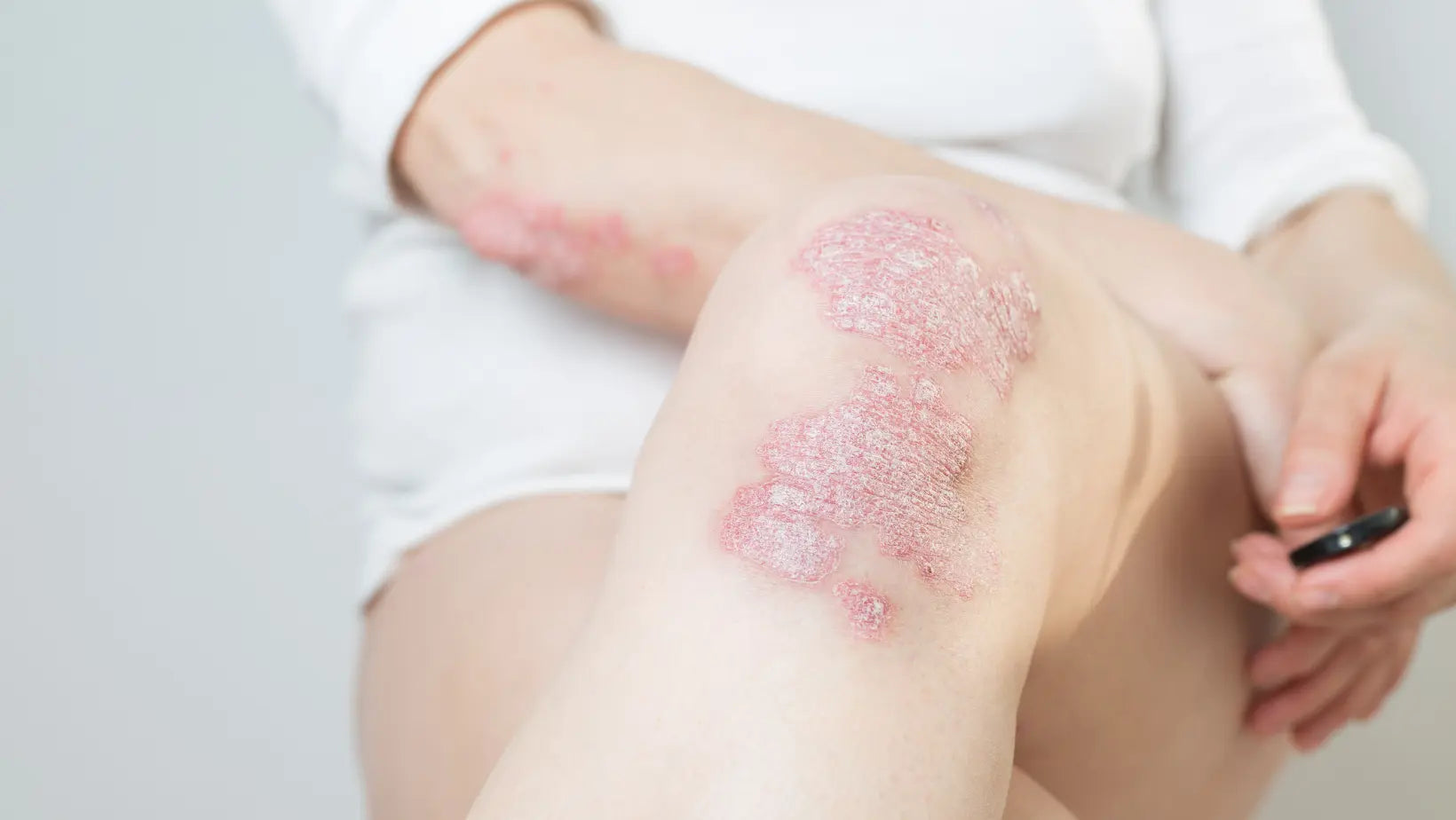
Swimming with psoriasis: What you need to know before diving in
For many of us, swimming is one of the pleasures of summer, offering a welcome refreshment on hot days and an excellent form of physical exercise. However, for people living with psoriasis, the idea of diving into water can bring specific questions and concerns. How does seawater or pool chlorine affect skin with psoriasis? Are there steps you can take to enjoy swimming without worsening your condition? Here are some essential information and tips to enjoy swimming even if you are dealing with psoriasis.
Swimming in salt water beneficial for psoriasis
Exploring the benefits of swimming in saltwater for people with psoriasis highlights a potential natural treatment for this troublesome skin condition. The salt and minerals naturally present in seawater have exfoliating and anti-inflammatory properties that can help reduce the thickness of psoriatic plaques and soothe redness and inflammation. This gentle cleansing action can facilitate the removal of scaling and contribute to improving the overall appearance of the skin.
The effect of salt water on skin hydration
One of the beneficial aspects of swimming in the sea is the ability of saltwater to support skin hydration. Although it may seem counterintuitive, minerals such as magnesium can improve the skin's ability to retain moisture, which is essential in managing psoriasis. Proper hydration supports the skin's elasticity and suppleness, contributing to maintaining a healthy and resilient skin barrier.

Improving the skin barrier
Salt water can also play a role in strengthening the skin barrier. By improving the skin's barrier function, the risk of infections and other irritations that can worsen psoriasis is reduced. This protective effect helps maintain skin health and can reduce the frequency and severity of psoriasis flare-ups.
Listening to the skin's reaction
With all these potential benefits, it is essential to pay attention to how your skin reacts to swimming in salt water. Each person's skin is unique, and what works for some may not be as effective for others. Carefully monitor any changes in your skin's condition and be prepared to take action if signs of excessive dryness or irritation appear.
Steps to follow
If you notice symptoms of irritation or increased dryness after swimming, it is crucial to act quickly to minimize discomfort. Rinse with fresh water immediately after leaving the sea to remove residual salts and minerals that can dry out the skin. Then, apply a nourishing moisturizing cream to restore moisture and soothe the skin. Choose products specially formulated for sensitive or psoriasis-affected skin to avoid common irritants that can worsen symptoms.
With the right approach and careful monitoring of the skin's reaction, swimming in salt water can be a pleasant and beneficial summer activity for people with psoriasis. However, it is important to stay informed and consult a specialist for personalized recommendations, ensuring that you make the most of the therapeutic properties of the sea without compromising your skin's health.
Swimming in the pool
Swimming in the pool offers a refreshing and accessible way to exercise, but the presence of chlorine in the water requires additional precautions for people with psoriasis. Chlorine is widely used to keep pool water clean by eliminating bacteria, but the chemicals can be harsh on sensitive skin, exacerbating the dryness and irritation associated with psoriasis.

Protection strategies against chlorine
1. Pre-swimming and post-swimming rinsing
A simple but effective step to minimize the impact of chlorine on the skin is to rinse well with fresh water before entering the pool and immediately after getting out. Pre-rinsing moistens the skin and hair, reducing the amount of chlorine absorbed. Post-rinsing removes chlorine and other chemicals from the skin, limiting their irritating effect.
2. Applying a protective barrier
For an extra level of protection, apply a thick moisturizing cream or a protective oil on the skin before entering the pool. These products act as a physical barrier between the skin and the chemicals in the water, protecting against dehydration and irritation. Petroleum-based products are particularly effective at blocking water and chemicals, but natural oils, such as coconut or jojoba oil, can also provide effective protection.
3. Limiting the duration of exposure to chlorine
To minimize exposure to chlorine and its potential negative effects, limit the duration of swimming sessions. Set a reasonable time to enjoy the pool water without endangering your skin health. After swimming, it is important to shower as soon as possible, using gentle soaps and shampoos formulated for sensitive skin, to remove any chemical residues left on the skin and hair.
4. Choosing post-swim care products
After the post-swim shower, generously apply a quality moisturizing cream or a repairing balm to the skin. This will help restore lost moisture and soothe any irritation. Looking for products with soothing ingredients, such as aloe vera, glycerin, or shea butter, can provide additional relief and support in maintaining the health of the skin barrier.

Although chlorine in swimming pools poses a challenge for people with psoriasis, by adopting appropriate precautionary measures, swimming can remain an enjoyable and beneficial activity. It is essential to listen to your skin's needs and adjust your care routine accordingly, allowing you to enjoy the benefits of swimming without compromising your skin's health. With proper attention and preventive care, the pool can be a source of fun and relaxation, even for those with psoriasis.
What to avoid
Regardless of where you choose to swim, there are some general practices you should avoid:
- Don't skip post-swim hydration: Always apply a rich moisturizing cream after rinsing off to help restore moisture and the skin barrier.
- Avoid staying in water for prolonged periods, as this can worsen dryness and irritation.
- If you use topical treatments for psoriasis, talk to your doctor about the best time to apply them around swimming sessions to maximize treatment effectiveness without irritating the skin.
Swimming can remain a pleasant and beneficial part of your life, even when living with psoriasis. The key is to understand how different aquatic environments can affect your skin and to take proactive measures to properly protect and care for your skin. With special attention to hydration and protection, swimming can be a source of joy and relaxation without endangering the health of skin affected by psoriasis.
It is essential to listen to the signals your skin sends you and to adjust your care routine accordingly. Armed with the necessary knowledge and precautions, summer and swimming can become sources of health and happiness, allowing you to enjoy every moment spent in the water, regardless of the challenges of psoriasis.



Leave a comment
This site is protected by hCaptcha and the hCaptcha Privacy Policy and Terms of Service apply.